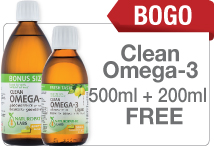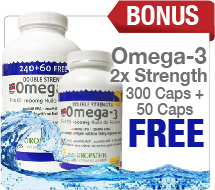- 120
- Calories
- 2g
- Fat
- 0g
- + Trans
- 0.5g
- Polyunsaturated
- 0.5g
- Omega-6
- 0g
- Omega-3
- 0.5g
- Monounsaturated
- 0mg
- Cholesterol
- 150mg
- Sodium
- 70mg
- Potassium
- 8g
- Carbohydrate
- 7g
- Fibre
- 1g
- Soluble Fibre
- 6g
- Insoluble Fibre
- 1g
- Sugars
- 20g
- Protein
- 6%
- Vitamin A
- 25%
- Vitamin C
- 4%
- Calcium
- 15%
- Iron
- 100%
- Vitamin D
- 100%
- Vitamin E
- 50%
- Vitamin K
- 60%
- Thaimine
- 50%
- Riboflavin
- 45%
- Niacin
- 60%
- Vitamin B6
- 90%
- Folate
- 300%
- Vitamin B12
- 100%
- Biotin
- 70%
- Pantothenate
- 10%
- Magnesium
- 25%
- Zinc
- 30%
- Selenium
- 15%
- Maganese
- 60%
- Chromium
- 50%
- Molybdenum
Organic Sprouted Protein 14.1g (80% protein), Organic Sprouted Brown Rice Protein 9.4g (80% protein)
Organic Sprout Blend 3mg [organic amaranth sprout 0.25mg, organic quinoa sprout 0.25mg, organic quinoa sprout 0.25mg, organic millet sprout 0.25mg, organic buckwheat sprout 0.25mg, organic garbanzo bean sprout 0.25mg, organic lentil sprout 0.25mg, organic adzuki sprout 0.25mg, organic flax sprout 0.25mg, organic sunflower sprout 0.25mg, organic pumpkin sprout 0.25mg, organic chia sprout 0.25mg, organic sesame sprout 0.25mg]
Organic Seed Blend: organic chia seed 1.25g, organic flaxseed 500mg.
Organic Fruit & Vegetable Blend: organic fruit and vegetable blend 365.5mg [organic spinach (leaf) 250mg, organic apple (fruit) 91.9mg, organic beet (root) 4.6mg, organic broccoli (stalk & flower) 4.0mg, organic carrot (root) 3.84mg, organic spinach leaf 3.2mg, organic tomato (fruit) 2.2mg, organic green bell pepper (fruit) 0.54mg, organic brussels spouts (bud) 0.33mg, organic ginger (root) 0.3mg, organic garlic (bulb) 0.29mg, organic onion (bulb) 0.28mg, organic parsley leaf (herb top) 0.15mg, organic cauliflower (flower & stem) 0.33mg, organic cabbage (herb top) 0.04mg, organic kale (leaf) 0.02mg, organic cucumber (fruit) 0.02mg, organic celery (stalk) 0.02mg, organic asperagus (shoot) 0.02mg, organic strawberry (fruit) 0.24mg, organic cherry (fruit) 0.19mg, organic blackberry (fruit) 0.09mg, organic blueberry (fruit) 0.04mg, organic raspberry (fruit) 0.03mg] organic brown rice (seed) 0.04mg, organic amaranth (seed) 0.74mg, organic auinoa (seed) 0.74mg, organic buckwheat (seed) 0.74mg, organic millet (seed) 0.74mg, organic chia (seed) 0.06mg
Organic Greens Blend: organic spirulina (broken cell) 100mg, organic alfalfa grass juice (herb top) 250mg, organic oat grass (herb top) 3mg, organic barley grass (leaf) 3mg, organic wheat grass (herb top) 3mg
Raw Probiotic Blend 1.5 Billion CFU: Lactobacillus plantarum (Lp-115) 144 billion CFU, lactobacillus delbrueckii subsp. bulgaricus (Lb-87) 0606 billion CFU
Enzyme Blend: lipase (aspergillus niger) 3.6 FCC LU, protease (aspergillus flavus var. oryzae, aspergillus niger) 400 FCC HUT, beta-Glucanase (trichoderma longibrachiatum) 0.475 FCC BGU, cellulase (aspergillus niger) 34.5 FCC CU, phytase (aspergillus niger) 0.95 FCC FTU, lactase (aspergillus flavus var. oryzae) 28.5 FCC ALU, Papain (carica papaya fruit) 13332.5 FCC PU, pectinase (aspergillus niger) 0.95 Endo-PG, xylanase (trichoderma longibrachuatum) 9XU, hemicellulase (aspergillus niger) 35.75 FCC HCU, bromelain (ananas comosus var.comosus stem) 10710 FCC PU
Raw Food-Created Nutrients: Vitamin C (ascorbic acid) 15mg, Vitamin E (d-alpha-Tocopherol) 10mg Alpha-Tocopherol, Niacinamide 10mg, Zinc (zinc hydrolyzed vegetable protein (HVP) chelate) 2.25mg, Pantothenic Acid (saccharomyces cerevisiae-whole) 5mg, Folic Acid (folate) 200mcg, Beta-carotene 300mcg, Biotin (saccharomyces cerevisiae-whole) 1mg, Thiamine/Vitamin B1 (saccharomyces cerevisiae-whole) 0.75mg, Chromium (chromium (III) hydrolyzed vegetable protein (HVP) chelate) 72mcg, Vitamin D2 (ergocaliferol) 5mcg, Vitamin B12 (saccharomyces cerevisiae-whole) 6mcg, Vitamin K 140mcg
Non-Medicinal Ingredients:
Isomaltooligosaccharides, Organic Cocoa, Organic Natural Flavour, Organic Erythritol, Organic Baobab Fruit, Sea Salt, Organic Stevia Leaf.
Format
 Powder
Powder
2lbs
Dosage
Adults mix 1 level scoop in 250ml of water or juice one (or more) times per day. Not intended for children.
Important Information
Contains no dairy, tree nuts, filler ingredients, artificial colours, flavours, sweeteners or preservatives.
- 44 Superfoods
- 20g of Protein Per Serving
- Only 1 g of Sugar
- 1.5B Live Probiotics + Enzymes
- 21 Whole Food Vitamins & Minerals
- Easy to Digest with Live Probiotics
- 7g of Organic Fiber
Related Videos
No Related VideosArticles by a naturopathic doctor.
Garden of Life brings you trusted products like Raw Organic Protein, Vitamin Code, MyKind Organics, Dr. Formulated Probiotics and Collagen. Certified Organic and non-GMO vitamins and supplements, Graden of Life always starts with real foods. These foods provide their formulas with the power to be their best.
What is protein?
Proteins are composed of building blocks called amino acids. These subunits are linked together by peptide bonds to form chains that can be straight lines, or branched like the sub-branches on a tree. When we eat protein the body must break these peptide bonds in the digestive tract using proteases. Then single amino acids, or amino acids in short chains (called peptides), are absorbed through the gut, into the body, where they are used as building blocks to create whatever protein the body needs.
Essential Amino Acids
Some amino acids are considered "non-essential". This means that we do not need to ingest these amino acids, because our bodies can biosynthesize them using the skeleton of other amino acids. So long as the body gets sufficient protein, these amino acids are not required. The amino acids that the body cannot produce itself need to be taken in through the diet, and are called "essential" amino acids. There are 9 essential amino acids: isoleucine, leucine, lysine, methionine, phenylalanine, threonine, tryptophan, histidine, and valine. Some amino acids are "conditionally essential", meaning that certain populations who naturally don't make enough, or all humans under certain conditions, may require certain dietary intake to meet their needs. Some examples of conditionally essential amino acids are: arginine, glutamine, cysteine, and glycine.
Protein Malnutrition
Protein is an easily available energy source for the body. When insufficient protein is ingested in the diet, or insufficient calories are taken in, the body will catabolize protein from muscle mass and then eventually from the organs to cover the deficit. This breakdown of body tissue can even happen before exhausting fat reserves. As protein levels drop, the body will prioritize protein usage to enzymes and signaling molecules to continue proper bodily function, and will catabolize other tissues to do so. As such, insufficient protein or calorie intake results in protein malnutrition, which causes muscle wasting, and eventually can lead to the breakdown of organs, and tissues. Eventually this causes a condition known as Kwashiorkor, which causes diarrhea, edema (swelling) and a large protruding belly.
Protein and Weight Loss
It is important to note the connection between low calorie diets and loss of muscle mass. Those individuals seeking to lose weight who overly restrict their dietary intake will ultimately lower their muscle mass. This is counterproductive, as our muscles are the body tissue that burns the most calories by weight. From a biological perspective, the body's response makes sense; when food is scarce, reducing the amount of calorie burning tissue you have, allows you to live with lesser requirements until food can be found again. In modern society, this leads to the inability to lose weight despite a calorie-restricted diet. Recently, the popularity of high protein diets has made supplementation of protein popular for weight loss. When protein is ingested with carbohydrate, it slows the rate at which sugar enters the body. By avoiding spikes in blood sugar, protein minimizes the storage of sugar as fat. Individuals with blood sugar imbalances, like diabetes and hypoglycemia, will benefit from protein's regulation of blood sugar. Because protein also builds muscle tissue, which burns more energy than other body tissue, it can also help weight loss.
- Reviews
- POST A NEW REVIEW





















